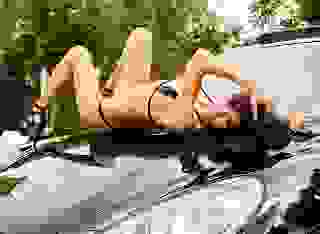Note: You can change font size, font face, and turn on dark mode by clicking the "A" icon tab in the Story Info Box.
You can temporarily switch back to a Classic Literotica® experience during our ongoing public Beta testing. Please consider leaving feedback on issues you experience or suggest improvements.
Click here"We need to find a way to escape," says Catherine to me. At least her degradation has made her wake up to the sinister purpose of this voyage.
"We're too far from land," I reply. "We would need to overpower the crew if we intend to escape before we reach our destination. Even if we can manage that, how many of us are able to sail this ship?"
"India is weeks away," says Abigail, who has been sitting nearby supervising Annie's and my efforts at cleaning Catherine. "The ship will need to stop to take on more supplies before we reach India. We could escape then."
"We're not going to India," I reply. "After this morning's events up on deck, I doubt any of this crew will dare to go near an English territory while we are on board."
"What?" exclaims Abigail. "Then where are we going?"
"My guess is North Africa," I reply. "Algiers. Tunis. Sale. Any one of the Barbary slave trading ports."
"But the Americans defeated the Barbary States," protests Dorothy. "The Barbary pirates are no longer a threat to Europeans."
I don't contradict Dorothy's wildly optimistic assertion. The Americans may have achieved a victory and freed many European slaves, but I doubt their actions will have entirely eliminated the centuries old trade in European slaves. The more I think about it, the more convinced I become that the slave markets in Sale, Morocco will be our destination. Reaching Algiers or Tunis will require sailing past the English ships patrolling the Straits of Gibraltar. An American merchant ship might pass an English patrol unmolested, but any English captain worth his rank would recognise a slave ship when he sees one and become suspicious. A routine inspection would prove disastrous for the Dickey-Wickey venture.
"We must keep everyone occupied and active, or we'll not be in a fit state to take any chance of escape which may come our way," I suggest to Catherine's committee the next day.
It doesn't seem the time to add that a fit and healthy girl on the auction block is likely to attract a better quality of bidder. Dorothy and Catherine both agree to my suggestion and they decide to start a daily routine of exercise and activity. Although there is a notable lack of enthusiasm, most of the women at least agree to keep to the proposed routine. We mustn't let the crew think we are beaten, even if we have little hope of escaping the Humphrey before our destination.
Connie, the bishop's daughter, has decided prayer is her, and our, best hope of salvation. Caroline and Martha join her in what becomes extended periods of religious devotion. While none of the other young women join them, we all leave the trio in peace to do what they think is right. I certainly can't offer a better solution at the moment.
Our routine gradually restores some spirit into our group. We make a pledge that if any of us escape, or are set free, then they will never cease to help secure the release of those remaining captive, no matter how long it takes. Our journey seems to take forever. Two weeks after departing Ireland the ship comes to a halt and the anchor is dropped. It's the middle of the night but my keen senses wake me to the change. A short while later, I hear the longboat being lowered over the side.
As soon as the first light of day brightens the sky, we are assembled on deck and our waists locked to a long chain known in the slave trade as a marching chain. I notice the ship's longboat has gone, and the normally ever-present Nathaniel Wickliffe is nowhere to be seen. Some of the crew must have left in the longboat with Wickliffe.
The handful of crew who remain onboard keep a very close watch on us even though they have us firmly locked in the marching chain. There is a moment of panic when someone speculates that the crew have chained us like this as they intend to dump us over the side of the ship to drown. But clearer heads prevail. If they were going to do that, then why bring us all this way and do it in full view of a city full of people. The crew are simply taking precautions in case one of us decides to jump overboard, or we all try to capture the ship in desperation.
I look around at the harbour and city. I recognise it at once. Sale, Morocco; the westernmost port of the Barbary Coast. Sale is definitely not a place for a young woman to go wandering around alone. It's not that safe for a ship's boy either, as I discovered to my cost when the Zafiro once called here during my seafaring days. Even if we weren't in the marching chain, a leap over the side and a swim for shore would be a case of jumping out of the frying pan and into the fire. Conversations soon break out along the whole length of our coffle. Captain Dickey walks over to us and commands silence.
"In an hour you will be off my ship and good riddance", he snarls.
But it's not an hour, or two, or even three. The sun is rising higher in the sky and the already warm morning is turning hot. We are at least moved under a hastily rigged canvas shade and allowed to sit down. Later, we are given water and food. Wickliffe's continued absence is making Captain Dickey and the crew very nervous indeed.
It's early afternoon before the Humphrey's longboat draws up alongside the ship. Wickliffe and a podgy middle aged man dressed in a djellaba, the traditional full length robe worn by both men and women in these parts, come aboard and go onto the quarterdeck where a very annoyed Captain Dickey is waiting. While we can't hear all of the conversation, we gather the Dickey-Wickey venture has run into problems and the middle aged man is offering a solution.
After much haggling a deal is struck although precisely what it is remains a mystery to us. We are returned to the hold and released from the marching chain. Speculation is rife, but even the crew don't seem to have any idea about what is going on. We can hear a lot of activity around the ship during the rest of the afternoon and evening, but we see nothing. In the middle of the night I hear the longboat being hauled back on board, followed a short while later by the unmistakeable sounds of the ship under sail. I initially assume that the ship is moving to a nearby dock so that we can be unloaded in the morning, but after a while I realise we are taking a longer journey.
"What's going to happen to us now?" whispers Julia from the adjacent hammock to mine.
I have been putting off thinking about that. I've been dreading anyone asking. I take a deep breath and am about to nervously answer Julia's question when Lisette speaks out.
"Unless some miracle happens it seems likely we will be marched though the main street to one of the slave markets. The market owner will write our names and details in a book. After letting prospective buyers examine us for a few days they will put us on the auction block and sell us."
I don't know how many of the others are awake to hear Lisette's words, but the collective gasps from around the hold suggest that there are more than a few. It isn't only what Lisette said, but the matter-of-fact way she said it. Anyone listening would have thought she was describing a Sunday walk in the park.
"We had better pray for a miracle then," says Connie.
If what actually happens counts as a miracle, then it's a tiny one. We are once again marched onto the ship's deck the next day, where I realise that we are no longer in Sale. The Humphrey has anchored in the mouth of a river, out of sight of any habitation. The river could be part of a delta of the Bou Regreg, the large river which flows from the distant Atlas mountains to the sea at Sale. Or it could be another river entirely. My knowledge of this region's geography is sketchy at best.
We are chained into groups of five or six women and ferried in the longboat, one group at a time, to a rickety wooden wharf on the south bank of the river. There we wait for several hours under the shade of some trees. Finally three covered wagons come trundling along a nearby dirt road. We are told to board the wagons and make ourselves as comfortable as possible. None of us have any idea what is going on, but at least we've been spared the indignity of being marched in a coffle through the streets of Sale. Perhaps the peace treaty between America and Morocco has resulted in the sale of white slaves being less public.
Captain Dickey and his crew are clearly happy to get us off their ship as quickly as possible. Once we are all onboard the wagons, Wickliffe hands Captain Dickey what appears to be several bags of gold. Presumably his share of their ill-gotten earnings. The captain and the longboat crew return to their ship. The wagons promptly set off to wherever we are going, so I can only assume that the Humphrey departs shortly afterwards.
The convoy of wagons stops a short while later and a large basket of fresh bread is put on the floor between us along with several pitchers of water. We quickly share this unexpected bounty between us. No telling when the next meal might arrive.
After two hours on the dirt road we spot a small hill ahead, on top of which stands an old fort. The driver doesn't complain when we move closer to the front to get a better look over his shoulder. He points to the fort and says something to us in Arabic, which none of us can understand. While I'm relieved we are not being taken straight to the slave market, this fort has all the appearances of a gloomy prison.
The heavy wooden gates are already open as we cross over a dry moat and between the two towers either side of the gates. I see a cannon mounted on top of each tower, but neither looks as though it has been fired in years. I notice a few armed men patrolling the battlements, but I cannot tell whether they are to keep prisoners in or uninvited visitors out.
If I had thought this place looked gloomy from the outside, then the inside shows me how wrong first impressions can be. Inside the fort is a small palace with three beautifully decorated buildings standing on three sides of a huge courtyard. The wagons stop in the courtyard. The drivers unfasten the tail-gates and we are helped down from the wagons. We gather together and look nervously around us. Wickliffe and the middle aged man who came aboard the Humphrey disappear into one of the buildings. Meanwhile, two huge men and a slender young woman walk towards us from one of the other buildings. It is the woman who speaks first, in flawless English.
"My name is A'isha and these two men are Samed and Mustafa. This place is known as Wadi Halaf and it is owned by my brother, Hassan. We had only a few hours notice of your pending arrival, so we are not fully prepared for so many of you. You look as though you could all do with a good bath. Go and wash yourselves before our evening meal. Mustafa, remove their chains, and Samed, escort them to the baths. I will leave you now to continue making preparations for your accommodation. Follow Samed's orders and he will show you where to go and what to do."
Without further ceremony A'isha walks off into one of the buildings with the look of someone with a lot to do and very little time to do it in. Without saying a word Samed guides us towards one of the buildings and down a long beautifully decorated corridor. I glimpse at the murals on the walls and see that they are very old and very ... erotic. Rebecca and Julia are walking beside me and they too have noticed the murals. Rebecca is blushing and doesn't know where to look.
"Look straight ahead and ignore the pictures," I say light-heartedly to Rebecca. I don't follow my own advice however and by the time we reach the end of the corridor I too feel a bit flushed.
The corridor opens into a large room where there are no less than three cascading pools, fed by a small waterfall at the top of the smallest pool. Samed is clearly a man of few words; in fact, no words at all as far as I can tell. He points to the soap and towels and indicates where we should leave our clothes. He turns away and closes the door behind him.
Although we are virtual strangers to each other, the events of the last two weeks have created a bond between us. A few of the women remain aloof, but the majority of us are soon splashing about in the pools naked. We take turns to scrub each other, and for the first time in ages I feel really clean. Our cavorting goes on for some time before we settle down to relax on the large cushions scattered around the pools.
"What is this place?" asks Martha.
"We are in the harem of this palace," answers Lisette.
All of a sudden we come back to reality. As luxurious as our surroundings are, there is no escaping the fact we have been sold as slaves and are sitting in the harem of our owner. Our sudden feeling of dread is only made worse when Helen discovers that all our clothes have been taken.
It is at that moment Samed and Mustafa walk into the room carrying three bundles. Those of us nearest the door quickly move away from them and cover our nakedness with our towels. Neither Samed or Mustafa pay us any attention though, seemingly unaffected by the presence of 32 naked nubile young maidens. Well, perhaps not all of us are maidens, but that's beside the point. The bundles are placed on the table in the corner of the room and Samed cuts the ropes holding each bundle together. Out spills an assortment of clothing and slippers.
"Be ready in an hour," says Mustafa.
Ready for what? Both men leave the room before any of us can think to ask them. We go over to the table and we quickly realise we are expected to select some clothing and slippers. They are all very pretty and I suspect they are of various styles commonly worn within a Moroccan harem. For the moment we put aside our fears as we embark on a frenzy of sifting through clothes. Only an hour, and so much to choose from!
The choosing process soon becomes a free for all, and the clothing may easily be ripped. Lady Catherine suddenly takes charge of the situation.
"Stop! You're going to damage the clothes. Let's sort them into sizes and styles so we can each choose something that we like and which will fit us."
Within 10 minutes the clothes are sorted into six groups laid out across the table and nearby cushions. We have sorted the clothes into three sizes and two basic styles. The two styles are quite different, one consisting of revealing silk tops, skirts, and trousers and the other containing much more modest styles made of decorated white muslin. Catherine calls for us to stand in a circle with her in the middle. She closes her eyes and spins round several times before stopping and pointing to ... Helen.
"You first Helen, and choose quickly or you forfeit your turn."
With a quick squeal of joy, Helen promptly chooses a beautiful white dress with a sequin waist and a pair of slippers. She quickly puts them on and replaces Catherine in the centre of the circle. The game continues with Catherine being the sixth one to choose, and the first to prefer silks. I am next to last and I find my choice limited to a silk outfit. I pick out a nice halter top and billowy trousers. There are no slippers left in my size but I manage to trade my larger pair with Dorothy as she had picked a size too small for her. There are a few silk items left over, which we gather into a single pile and leave on the table.
While this is going on Ruth has discovered an area behind a screen with combs and mirrors. There are wash basins and toilets there as well. We use our remaining twenty minutes combing our hair and preparing ourselves for whatever it is we need to be ready to face. A'isha appears at the end of the hour. She is dressed in silks very similar to those I wear and I must say she looks very attractive and graceful as she walks across the room towards us. She smiles and seems relieved that we are, in fact, ready. If it hadn't been for Catherine she may well have walked in on 32 squabbling young women and a lot of torn clothing.
"Come, our meal awaits us and I will answer your questions while we eat," says A'isha.
She leads us further into the harem and we enter a large area with low tables and cushions. On the tables sit a variety of dishes and juices which represent the first decent meal we have seen in ages. We follow A'isha's example and take a plate and help ourselves to modest portions of whatever takes our fancy. I bravely resist the temptation to pile my plate high. We sit on the cushions and promptly devour our food, returning to the table several times for more food and drink. Samed and Mustafa stand like sentries by the archway. A'isha patiently waits until our feeding frenzy eases.
"Let me tell you a bit about where you are and then I'll answer your questions," says A'isha. Without waiting for a reply she continues. "This place is know as Wadi Halaf and is owned by my brother, Hassan. In former times Wadi Halaf was fort guarding the borders of Sale. My great grandfather was a famous corsair and with his treasures he converted this fort into the grand house you see around you. This building is the old harem, although until your arrival today parts of it haven't been used for many years. Tomorrow you will be shown around those parts of the house you are permitted to enter. Now I will answer your questions, but please say your name when you ask as I don't know any of your names yet".
"I'm Dorothy. What's going to happen to us? What does your brother intend to do with us?"
"Tomorrow you will be formally admitted into the household. We will record your names and assess your skills and attributes to see what duties you may best perform. We will also make a physical examination of you. As for your second question, I'm afraid I don't know. My brother is away on business in Rabat. As far as I'm aware he doesn't yet know my uncle Rashid has purchased you in his name. I think he'll be in for a surprise when he returns later tonight."
"And what will our duties consist of, might I ask? Oh, I'm Catherine."
"Well Catherine, there are many domestic duties to be done in a house this size. This meal you are enjoying did not fall from the sky. The rooms and the corridors must be kept clean. For those who are good at embroidery and needlework, there are tasks that need those skills."
"And what our our virginity. Is it our fate to wait in line while your brother sates his lust and deflowers us?" blurts out Ruth, trying to keep her voice steady.
In my case that isn't an issue, but it's definitely a question we would like to know the answer. A'isha looked stunned at the question and then falls about in a fit of laughter. Not quite the reaction to Ruth's question I was expecting.
Chapter 3: Harem slave
"Oh, I'm sorry for laughing my dear", says A'isha, regaining her composure. "But tell me your name."
"I'm R..R..Ruth", stammers Ruth, suddenly feeling very embarrassed.
"I forget you are not aware of our customs. It is true there are men in Sale who would treat their slave girls in that way, and worse, but Hassan is very content with his current concubines. If you wish to bed my brother you must first try to catch his attention and then work very hard to seduce him. Jasmina and Miri won't make that easy for you."
There is an almost visible sigh of relief from the around the room. It seems that we only need to keep a low profile and we won't get molested.
"I'm Caroline. Who are Jasmina and Miri?"
"You will meet them tomorrow, Caroline. They are my brother's two concubines."
We ask many questions over the next hour and A'isha answers them as best she can. We learn that Samed and Mustafa are the household's two eunuchs and, apart from Hassan, are the only men allowed inside the harem. While they are our rulers within the harem they are also our protectors. A'isha makes a point of telling us we must do as they tell us or they will punish us.
Our conversation continues and we learn that Hassan is A'isha's twin brother and is 25 years old. Their father had instructed on his deathbed that Hassan take over the family trading business, rather than his uncle Rashid. The business owns three ships and trades in spices, fine cloths and other quality trade goods. Like his father, Hassan has refused to become involved in the slave trade, a decision which Rashid opposes. It is Rashid who purchased us with Hassan's money, hoping to force his nephew's hand.








